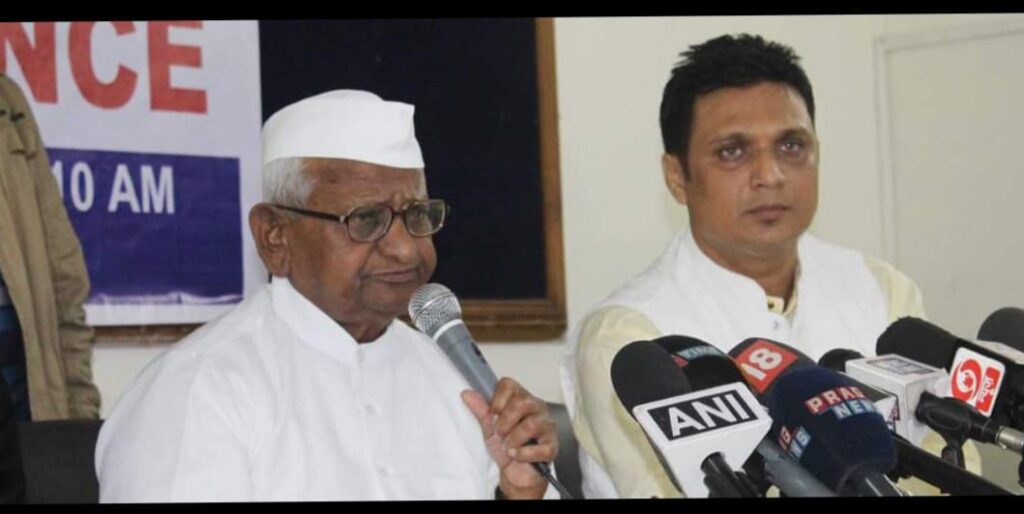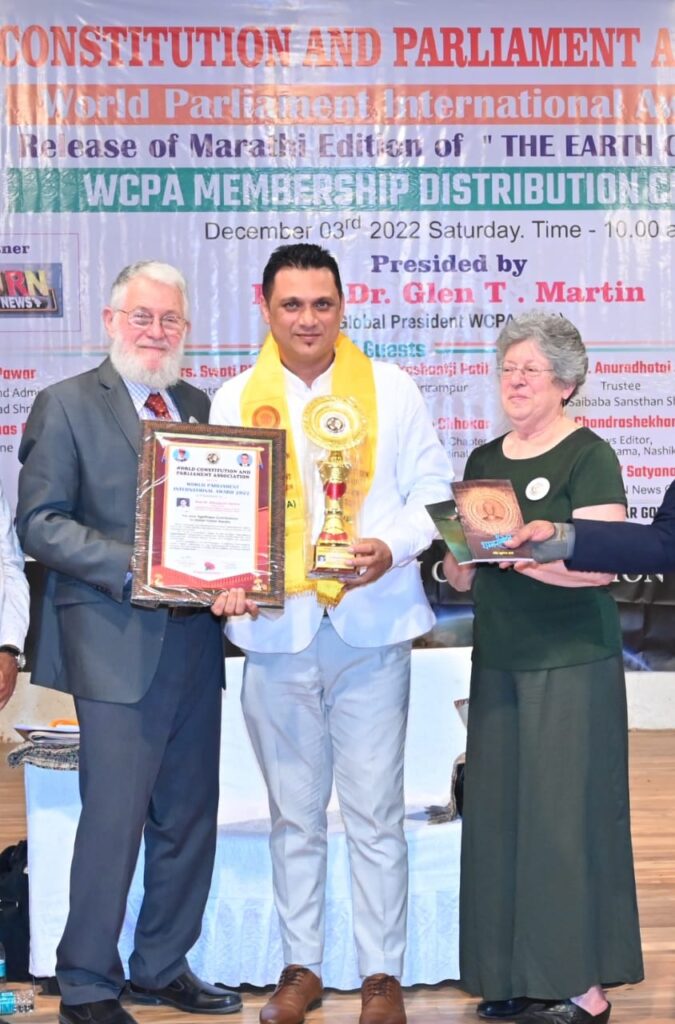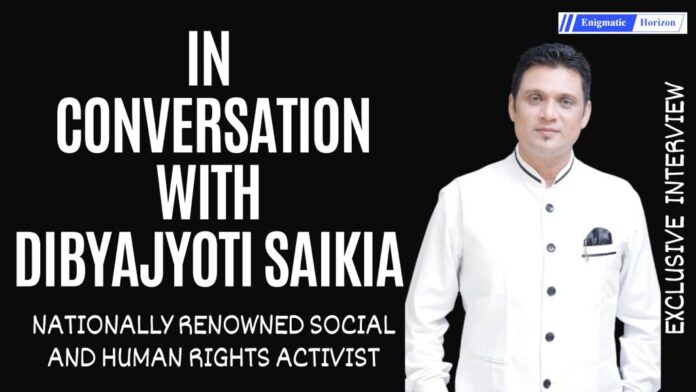Edited by – Robin Bhuyan (Editor in Chief)
Written by – Rinku Sharma
Interviewed by – Mohsin Khaiyam
Dr. Dibyajyoti Saikia is a human rights and social activist from Assam who is known for his work in witch hunting, as well as drug abuse and mob lynching.
Dibyajyoti Saikia is also a motivational speaker and is known to have trained youth and community leaders.
Join us in our exclusive chat with Dr. Saikia to understand more about his visions, as well as some of the biggest problem in Assam as well as rest of India.
Before we begin, in your words, could you tell us who Dr. Dibyajyoti Saikia is?
It is really hard to describe who I am. However, all I can say is that I am a person working for the common people. I work to find solutions for issues that are important to the common man, such as health, education, etc. I’ve been working for the public for a very long time. So, basically you can say that I am a person serving the masses.
You are recognized throughout India as a person who works for common people. Among the major issues pertaining to human rights in Assam, which one is the most important issue right now?
Human rights is a broad topic. People still don’t know about their rights and the resources provided by the system. Today, the government is responsible for providing hospitals with all kinds of emergency and medical services. But we can say that the entitlement of a person to their life is being violated. Good healthcare facilities are a basic necessity for survival. However, people are still deprived of basic emergency services. The government system can be seen to be becoming corrupted. People still have a fear of speaking up and demanding their rights. This is because they don’t understand their rights better.

You have filed cases regarding encounters in Assam. Would you like to comment on these?
I raised this issue of encounters in Assam at the national level. I went to the National Human Rights Commission, communicated with the officials, and even filed petitions there. In response, the National Human Rights Commission gave justice and compensation to 45 people. The encounter incidences in Assam have decreased recently, thanks to our work.
Have you received any threats since bringing up the encounter matter with the National Human Rights Commission?
No one has directly threatened me as of yet, but there have been implied threats. I’ve been informed that I might not be receiving awards such as the Padma Shri if I continue to work on such cases. However, I have worked neither for receiving any kind of government awards nor for any recognition. Besides, I have already been honored with multiple awards due to my work on human rights issues. I’ve also turned down numerous awards. I have worked for 24 years for the people. So now I don’t fear any kind of threat.
You have worked on health-related issues. One significant problem you worked on is snake bites. Please elaborate.
In the event of a poisonous snake bite, the victim should be taken to the hospital right away so that anti-snake venom can be administered. However, only a small number of doctors in Assam are qualified to handle these snake bite cases. I’ve visited a number of hospitals where the anti snake venom was nonexistent or in less quantity. There are also instances where treatment hasn’t been performed by the medical professionals. I had visited Gohpur Hospital, Tezpur Medical College, and other places a few years ago. I brought up the issue of doctors and anti-snake venom scarcity there. After a few days, I learned that doctors were being appointed there. In the upper Assam region, training facilities were also set up. I don’t want to take credit for this, but I would say that this is a success story.
In addition, I would like to inform you that certain hospitals in Assam do not have the rabies vaccine. Additionally, doctors in Assam hospitals lack heart specialists who can treat heart attacks, which are rising in numbers since the last two years. Because of the inadequate number of facilities in Jorhat, a scientist had passed away.
There is a lack of medical supplies, such as bandages and medication, even in hospitals like GMC. What do you have to say about this?
The health department can be seen to be committing a grave mistake here. These facilities ought to be available for emergency medical care. If the hospitals are asking people to purchase these emergency facilities, it’s possible that the government is providing them, but hospitals might be selling them for their own profit. Despite being aware of this, the office, neither the CM nor the health department, has taken appropriate action.
Witch hunting and superstition are the two main problems in Assam. Tell us how you have worked on these problems.
I have worked on awareness campaigns in Jharkhand, Maharashtra, MP, Chhattisgarh, and other states. I even went to Chattisgarh to solve a 40-year-old case. I was also a National Core Committee Member of Team Anna from 2016 to 2020. In Assam, there have been numerous cases of witch hunting, which troubled me. Based on my observations, the main reason is due to a lack of education. The term witch hunting is incorrect, in my opinion, since there is no such thing as a “witch”. It is murder committed in the name of superstition or witchcraft. We ought to get rid of this term. Conspiracy is the cause of more than 60% of cases. It’s usually to get rid of someone from the village. When a man or woman with intelligence becomes uncontrollable, they are labeled as a witch and killed. People who are ignorant or are only partially educated are usually behind this kind of attacks.
I’ve put a lot of effort into such cases. Eventually, The Assam Witch Hunting Act Bill was approved as a result. This appeared as an Act in 2018. Numerous arrests were made after this Act was put into effect. Now, witch hunting cases have decreased.

What is the biggest reason for superstition in Assam or other parts of India?
The main factor leading to superstition here is illiteracy. Our education system should be skill-based. Lack of life-oriented and proper education is a big problem, and in India, our education system is certificate and marks-oriented. Both skill and wisdom should be the foundation of the educational system. Only then will it qualify as true education. One should be able to make moral judgments through education. Consider the US and China. Their advanced economies can be attributed solely to skill-based education. Our cities, states, and nation will advance if our educational system is likewise skill-based.
In addition to your work on human rights and social activism, you have plans to build an agro-tourism farm in Lakhimpur. Could you please elaborate on this project?
The project is still in the initial stage. The total project land is more than 25 bighas, including a 25-year-old tea garden. I want to get out the word that working on our own property has many advantages. First and foremost, our land will be preserved. In addition, organic farming will protect people from all kinds of ailments. Thirdly, it will help those without jobs. I want to motivate people to work on their own land. I encourage the government to support those who work in agriculture. You will be able to see my farm in three more years, which I hope will inspire people to work on their own land!
